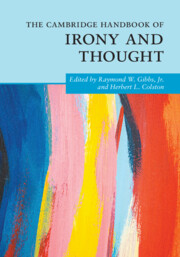Book contents
- The Cambridge Handbook of Irony and Thought
- Cambridge Handbooks in Psychology
- The Cambridge Handbook of Irony and Thought
- Copyright page
- Contents
- Contributors
- Part I Introduction
- Part II The Scope of Irony
- Part III Irony’s Impact
- 5 Irony as Social Work: Opposition, Expectation Violation, and Contrast
- 6 Rorty, Irony, and Neoliberalism
- 7 Irony and Its Consequences in the Public Sphere
- Part IV Irony in Linguistic Communication
- Part V Irony, Affect, and Related Figures
- Part VI Irony in Expressive, Nonlinguistic Media
- Index
- References
6 - Rorty, Irony, and Neoliberalism
from Part III - Irony’s Impact
Published online by Cambridge University Press: 20 December 2023
- The Cambridge Handbook of Irony and Thought
- Cambridge Handbooks in Psychology
- The Cambridge Handbook of Irony and Thought
- Copyright page
- Contents
- Contributors
- Part I Introduction
- Part II The Scope of Irony
- Part III Irony’s Impact
- 5 Irony as Social Work: Opposition, Expectation Violation, and Contrast
- 6 Rorty, Irony, and Neoliberalism
- 7 Irony and Its Consequences in the Public Sphere
- Part IV Irony in Linguistic Communication
- Part V Irony, Affect, and Related Figures
- Part VI Irony in Expressive, Nonlinguistic Media
- Index
- References
Summary
This chapter discusses the philosopher Richard Rorty’s influential writings on the contingent nature of ironic thinking and expression. Rorty argued that irony does not reveal foundational truths, but is employed to help us “depict the world through multiple points of view.” Irony provides a way of individually recreating the world for ourselves rather than offering a special device to demystify assumptions about reality that somehow exists outside of language. Rorty’s claimed that writers such as Proust, Heidegger, Nietzsche, and Derrida are ironists given their questions about the stories and vocabularies we inhabit. Literature is especially useful for creating spaces for irony as sites for creative, nonjudgmental self-examination. But philosophy is also a kind of playful ironic writing that helps us to create useful redescriptions of the world and our roles in it. Colebrook emphasizes that Rorty rejected the idea that irony is just a trope in which one thing is said and another is meant. Irony is “the very opposite of searching for essences,” which is why it is so important for understanding liberalism with its emphasis on the “politics of tolerance, anti-foundationalism, and freedom of speech.”
Keywords
- Type
- Chapter
- Information
- The Cambridge Handbook of Irony and Thought , pp. 96 - 111Publisher: Cambridge University PressPrint publication year: 2023

